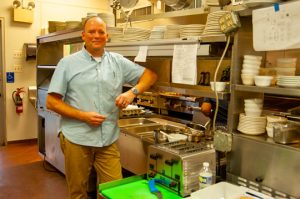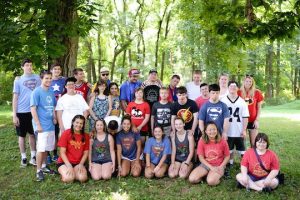Despite Accu-Weather’s 5-Day Forecast calling for light snow, the Kennett Symphony Orchestra presented “Welcome Spring” as its third and final conductor audition concert at the Madeleine Wing Adler Theater at West Chester University, Saturday evening, March 22.
The search, which started with Michael Hall’s “Opening Night Spectacular” audition concert on September 21, and Rei Hotoda’s “”Spirit of the Season” on Dec. 7, concluded Saturday night with David Alexander Rahbee.
A native of Boston, Rahbee studied conducting at the New England Conservatory, Universität für Musik und Darstellende Kunst, in Vienna, and at the Pierre Monteux School and received his doctorate of musical arts in orchestral conducting from the Université de Montréal. He is currently artist -in-residence at Seattle’s University of Washington, School of Music where he conducts the University Orchestra.
And on Saturday night, he proved himself a master of thematic programming as he led the Kennett Symphony in Beethoven’s “Symphony No. 6 (Pastoral)” and Copland’s “Appalachian Spring”.
Beethoven’s “Pastoral Symphony” is as significant as is Beethoven’s historic role as a bridge between the more rigid and formal style of the classical period and the more expansive and expressive style of the romantic period. Indeed, not only does the symphony have five movements as opposed to the traditional four, but in the second movement features passages evocative of pastoral sounds such as the Nightingale (flute), Quail (oboe) and Cuckoo (clarinet). This gave the talented principal chairs in Kennett’s woodwind section a chance to shine- and they did. Bravos all around!
After the intermission, Rahbee addressed the audience for the first time in his program. With the hesitancy of a college graduate instructor he asked if people in Pennsylvania say “Ap-pa- LAH- chan” or “Ap pa- LAY- shun”. When a chorus of “Ap-pa-LAY-shuns” rang out he replied, “OK- Our next number is Ap-pa-LAY-shun Spring”. As appreciative laughter rippled through the audience, a visibly more at ease Rahbee went on to describe the changes taking place in the now 20th century orchestra, as Copeland added bells, glockenspiel, xylophone, triangle, woodblock, harp and piano.
Nothing says America like the music of Aaron Copeland. His music speaks of all that was good in early America. “Appalachian Spring” has indeed become an iconic spiritual journey to the very heart of times gone by. Copeland’s music originally, written for the ballet of the same name, describes a spring celebration of 19th century American pioneers after building a new Pennsylvania farmhouse. An early movement let the classically-trained string section let loose with the syncopation and open fifths of American fiddle music, while a later movement in the suite incorporated the familiar Shaker tune, “Simple Gifts”.
After the concert, the audience was invited to stay for a short question and answer session with Dr. Rahbee. And as the few remaining audience members moved up to the front, Rahbee seemed much more at ease with the smaller number and spoke as if he were in a familiar setting.
It was a most enjoyable evening. David Alexander Rahbee is a young man with a very bright future ahead of him.
To find out which candidate Sally thinks the symphony should choose as its new conductor, go here.
About Sally Denk Hoey
Sally Denk Hoey, is a Gemini - one part music and one part history. She holds a masters degree cum laude from the School of Music at West Chester University. She taught 14 years in both public and private school. Her CD "Bard of the Brandywine" was critically received during her almost 30 years as a folk singer. She currently cantors masses at St Agnes Church in West Chester where she also performs with the select Motet Choir. A recognized historian, Sally serves as a judge-captain for the south-east Pennsylvania regionals of the National History Day Competition. She has served as president of the Brandywine Battlefield Park Associates as well as the Sanderson Museum in Chadds Ford where she now curates the violin collection. Sally re-enacted with the 43rd Regiment of Foot and the 2nd Pennsylvania Regiment for 19 years where she interpreted the role of a campfollower at encampments in Valley Forge, Williamsburg, Va., Monmouth, N.J. and Lexington and Concord, Mass. Sally is married to her college classmate, Thomas Hoey, otherwise known as "Mr. Sousa.”



Comments